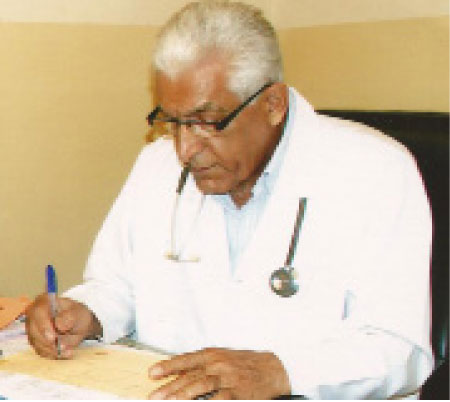
“High blood pressure is a public health problem worldwide, mostly in developing countries. By the year of 2025, about 1.17 billion people with blood pressure equal to or greater than 140/90 mmHg or on blood pressure lowering medication will be living in emerging nations. Although hypertension is a major risk factor for heart disease, most developing countries lack reliable estimates of nationwide prevalence.Even though efficacious anti-hypertensive medications are available, a large fraction of the population does not know they have high blood pressure and one-third of hypertensive individuals have controlled hypertension. Lifestyle changes including weight control, diet with reduced sodium, vegetables, fruits, and fat-free or low-fat dairy products, and exercise are effective interventions to control hypertension. Since hypertension is incurable, long-term strategies such as educational interventions should be implemented to prevent its development.”
Hypertension Known as the “silent killer”, high blood pressure rarely has obvious symptoms.
Around 30% of people in England have high blood pressure but many don’t know it. If left untreated, high blood pressure increases your risk of a heart attack or stroke.
The only way of knowing there is a problem is to have your blood pressure measured.
All adults should have their blood pressure checked at least every year. If you haven’t had yours measured, or you don’t know what your blood pressure reading is, ask your Doctor/Nurse to check it for you.
What is high blood pressure?
Blood pressure measures how strongly blood presses against the walls of your arteries (large blood vessels) as it is pumped around your body by your heart. If this pressure is too high it puts a strain on your arteries and your heart, which makes it more likely that you will suffer a heart attack, a stroke or kidney disease.
Blood pressure is measured in millimeters of mercury (mmHg) and it is recorded as two figures:
•systolic pressure: the pressure of the blood when your heart beats to pump blood out
•diastolic pressure: the pressure of the blood when your heart rests in between beats
For example, if your Doctor/Nurse says your blood pressure is “140 over 90”, or 140/90mmHg, it means you have a systolic pressure of 140mmHg and a diastolic pressure of 90 mmHg.
You are said to have high blood pressure (medically known as hypertension) if readings on separate occasions consistently show your blood pressure to be 140/90 mmHg or higher.
A blood pressure reading below 130/80mmHg is considered to be normal.
Who is most at risk?
Your chances of having high blood pressure increase as you get older. There is often no clear cause of high blood pressure but you are at increased risk if you:
•are overweight
•have a relative with high blood pressure
•are of African or Caribbean descent
•eat a lot of salt
•don’t eat enough fruit and vegetables
•don’t do enough exercise
•drink a lot of coffee (or other caffeine-based drinks)
•drink a lot of alcohol
•are aged over 65
Preventing high blood pressure
Having high blood pressure can be prevented by eating healthily, maintaining a healthy weight, taking regular exercise, drinking alcohol in moderation and not smoking.
Diet
Cut down on the amount of salt in your food and eat plenty of fruit and vegetables.
Salt raises your blood pressure. The more salt you eat, the higher your blood pressure. Aim to eat less than less than 6g (0.2oz) of salt a day.
Tips for a lower-salt diet
If you’ve read up on salt facts, you’ll know that too much salt can cause raised blood pressure, which increases the risk of heart disease and stroke. The following tips can help you to cut down on salt.
You don’t have to add salt to your food to eat too much of it – around 75% of the salt we eat is already in everyday foods such as bread, breakfast cereal and ready meals.
Remember, whether you’re eating at home, cooking or eating out, don’t add salt to your food automatically – taste it first. Many people add salt out of habit, but it’s often unnecessary, and your food will taste good without it.
Shop for low salt foods
Use nutrition labels to help you cut down on salt:
•high is more than 1.5g salt per 100g (or 0.6g sodium)
•low is 0.3g salt or less per 100g (or 0.1g sodium)
When shopping for food, you can take steps to cut your salt intake:
•Compare nutrition labels on food packaging when buying everyday items. You can really cut your salt intake by checking the label and choosing the pizza, ketchup or breakfast cereal that’s lower in salt. Try choosing one food a week to check and swap when you’re food shopping.
•Go for reduced-salt, unsmoked back bacon. Cured meats and fish can be high in salt, so try to eat these less often.
•Buy tinned vegetables without added salt. Do the same with tinned pulses.
•Watch out for the salt content in ready-made pasta sauces. Tomato-based sauces are often lower in salt than cheesy sauces or those containing olives, bacon or ham.
•For healthier snacks, choose fruit or vegetables such as carrot or celery sticks. If you are going to have crisps or crackers, check the label and choose the ones lower in salt.
•Go easy on soy sauce, mustard, pickles, mayonnaise and other table sauces, as these can all be high in salt.
Cook with less salt
Many people add salt to food when cooking. But there are lots of ways to add flavour to your cooking without using any salt. Check out these salt alternatives:
•Use black pepper as seasoning instead of salt. Try it on pasta, scrambled egg, pizzas, fish and soups.
•Add fresh herbs and spices to pasta dishes, vegetables and meat. Try garlic, ginger, chili and lime in stir fries.
•Make your own stock and gravy instead of using cubes or granules, or look out for reduced-salt products.
•Try baking or roasting vegetables such as red peppers, tomatoes, courgettes, fennel, parsnips and squash to bring out their flavor.
•Make sauces using ripe flavorful tomatoes and garlic.
Alcohol
Regularly drinking alcohol will raise your blood pressure over time. Staying within the recommended levels is the best way to reduce your risk of developing high blood pressure.
.Alcohol is also high in calories, which will make you gain weight. This will also increase of obesity
Caffeine
Drinking more than four cups of coffee a day may increase your blood pressure. If you are a big fan of coffee, tea or other caffeine-rich drinks (such as cola and some energy drinks), consider cutting down. It is fine to drink tea and coffee as part of a balanced diet but it is important that these drinks are not your only source of fluid. Find out if you are drinking enough fluids.
Weight
Being overweight forces your heart to work harder to pump blood around your body, which can raise your blood pressure. Find out if you need to lose weight with the BMI healthy weight calculator.
If you do need to shed some weight, it is worth remembering that just losing a few pounds will make a big difference to your blood pressure and overall health. Get tips on losing weight safely.
Exercise
Being active and taking regular exercise lowers blood pressure by keeping your heart and blood vessels in good condition. Regular exercise can also help you lose weight, which will also help lower your blood pressure.
Adults should do at least 150 minutes (2 hours and 30 minutes) of moderate-intensity aerobic activity (i.e. cycling or fast walking) every week. For it to count, the activity should make you feel warm and slightly out of breath. Someone who is overweight may only have to walk up a slope to get this feeling. Physical activity can include anything from sport to walking and gardening. Get more ideas on being active.
Smoking
Smoking doesn’t directly cause high blood pressure but it puts you at much higher risk of a heart attack and stroke. Smoking, like high blood pressure, will cause your arteries to narrow. If you smoke and have high blood pressure, your arteries will narrow much more quickly and your risk of a heart or lung disease in the future is dramatically increased. Get help to stop smoking.
Objectives of World Health Day 2014 include:
•raising awareness of the causes and consequences of high blood pressure
•providing information on how to prevent high blood pressure and related complications
•encouraging self-care to prevent high blood pressure
•making blood pressure management affordable to all
Prevention and treatment of the condition has brought about a reduction in deaths from heart disease in developed countries but nearly two-thirds of the global hypertensive population lives in low- and middle-income countries.
The only way to know if you have high blood pressure (hypertension) is to have your blood pressure checked.
Ideally, your blood pressure reading should be below 120/80 mmHg.
However, anything under 130/80 mmHg is generally considered normal.
For further information please seek advice from medical professionals at various Government Hospitals, NGO’s and private Clinics, call on Afri radio every wed. from 9-9.30,text
Dr Azadeh on 7774469 or azadehhassan@yahoo.co.uk
Author: Dr H. Azadeh, Senior Lecturer University of the Gambia, Senior Consultant in Obstetrics & Gynecology.




